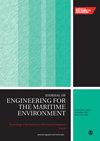增强规定性能的气垫船状态约束安全自适应轨迹跟踪控制方案
IF 1.5
4区 工程技术
Q3 ENGINEERING, MARINE
Proceedings of the Institution of Mechanical Engineers, Part M: Journal of Engineering for the Maritime Environment
Pub Date : 2024-08-24
DOI:10.1177/14750902241270842
引用次数: 0
摘要
本文研究了一种具有增强规定性能的气垫船状态约束安全自适应轨迹跟踪控制方案。首先,考虑位置误差,引入一对新的规定单调管边界函数与滑动模式相结合,得到虚拟速度控制律,并通过采用变换误差函数将位置误差简化为等效无约束控制系统。与传统的规定性能控制不同,新函数的(瞬态和稳态)控制性能与用户定义的一些实际指标(如过冲、精度和收敛时间)之间存在定量关系,且不太保守。因此,这种方法便于设计和工程实践。其次,为了解决速度安全约束问题,采用了一种新颖的非对称积分屏障李亚普诺夫函数(AIBLF),在非对称安全约束条件下限制气垫船的速度。此外,还引入了生物启发神经动力学模型来处理虚拟控制法则的差分爆炸。为了估算控制系统不确定性等未知项,利用了神经网络(NN)。根据 Lyapunov 稳定性理论,总控制系统最终是均匀有界的。通过比较仿真验证了所提控制方案的有效性和优越性。本文章由计算机程序翻译,如有差异,请以英文原文为准。
A state-constrained safety adaptive trajectory tracking control scheme for a hovercraft with enhanced prescribed performance
In this paper, a state-constrained safety adaptive trajectory tracking control scheme for a hovercraft with enhanced prescribed performance is studied. Firstly, considering the position error, a novel pair of prescribed monotone tube boundary functions combined with a sliding mode is introduced to obtain virtual velocity control laws, and the position error is simplified into an equivalent unconstrained control system by adopting the transformed error function. Unlike traditional prescribed performance control, the new function has a quantitative relationship between (transient and steady-state) control performance and some practical user-defined metrics such as overshoot, precision, and convergence time, and is less conservative. Therefore, this method is convenient for design and engineering practice. Secondly, in order to solve problems of velocity safety constraints, a novel asymmetric integral barrier Lyapunov function (AIBLF) has been adopted to limit velocities of hovercraft within the asymmetric safety constraints. Moreover, a bioinspired neurodynamic model is introduced to handle differential explosion of virtual control laws. For the sake of estimating the unknown terms such as the control system uncertainties, the neural networks (NNs) are utilized. Total control system is ultimately uniformly bounded according to Lyapunov stability theories. Effectiveness and superiority of the proposed control scheme are verified by comparative simulation.
求助全文
通过发布文献求助,成功后即可免费获取论文全文。
去求助
来源期刊

CiteScore
3.90
自引率
11.10%
发文量
77
审稿时长
>12 weeks
期刊介绍:
The Journal of Engineering for the Maritime Environment is concerned with the design, production and operation of engineering artefacts for the maritime environment. The journal straddles the traditional boundaries of naval architecture, marine engineering, offshore/ocean engineering, coastal engineering and port engineering.
 求助内容:
求助内容: 应助结果提醒方式:
应助结果提醒方式:


